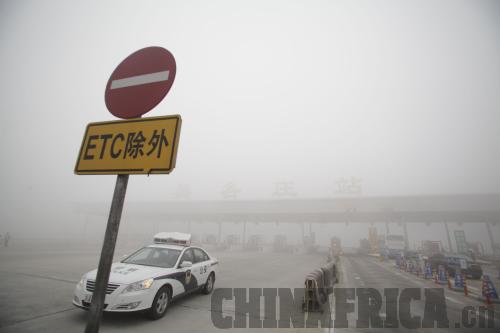|
|

|
|
HAZY DAYS:Beijing under a veil of smog (WANG SHEN) |
Beijing's winter of 2011 has been a bad time for Guo Changyan. As a frail girl, who often falls ill, the capital's serious air pollution is playing havoc on her health. "I have been coughing since the beginning of the hazy weather, but have to work outside every day even though I know long-term exposure to the pollution will exacerbate my cough," Guo, an employee of a non-profit organization in Beijing, told ChinAfrica.
To her surprise, the government's report on air quality described the pollution as "slight," contradicting with her observation. "I don't think the pollution [that day] was slight. It was grave," she noted.
The contradiction comes from the different air monitoring standards. Chinese cities previously did not measure and disclose data on the smaller airborne particulate matter, PM (Particulate Matter) 2.5, those with a diameter smaller than 2.5 microns. Instead, China uses a PM 10 standard in reporting daily air quality. But it is PM 2.5 that is accepted as the major cause of this winter's polluted skies.
Consequences
Actually, PM 2.5 is more harmful to people's health. According to experts, respiratory diseases from the polluted air include lung infections and cancer. "Without intervention, PM 2.5 would replace tobacco smoking as the top risk factor for lung cancer," Zhong Nanshan, a respiratory expert and academician of the Chinese Academy of Engineering, said in an interview with China Daily.
The bad air also disrupted traffic, leading to hundreds of canceled flights and heavy traffic congestion.
About 219 flights were canceled and 118 delayed as of 3 p.m. on December 5, 2011, one day after a heavy smog covered Beijing Capital International Airport, said a notice posted on the airport's website.
Source of pollution
The smog is not a natural phenomenon but results from people's current lifestyle. "Chemical fuel combustion, such as those used for industry and heating supply, and vehicle exhaust emissions contribute a lot to the existence of the high percentage of PM 2.5 in the air," Wang Qiuxia, an environmental protection advocate from Da'erwen Environmental Research Center, told ChinAfrica. Her center is a Beijing-based non-profit organization spreading knowledge about environmental protection.
Particularly in Beijing, the large numbers of automobiles in use worsens the air condition. In 2011, the number of automobiles in Beijing reached 5 million. Currently, despite of the policy of restricting car purchase, there are still about 2 million cars running on the road every day in the capital. "The number of vehicles and subsequent traffic jams are the main source of PM 2.5 in Beijing," He Kebin, Professor of School of Environment of Tsinghua University, told China Newsweek.
Government response
But soon the Chinese people will not see the contradiction between what they see and the data release from the authorities. The Chinese Government has tightened the standard of monitoring air quality nationwide by including PM 2.5 in the monitoring system.
In China's seventh environmental protection meeting held in Beijing December 20 - 21, 2011, the highest-ranking of its kind, a detailed timetable for Chinese cities to monitor pollution was laid out.
"The new air quality standards, those including PM 2.5, ozone and carbon monoxide, should be published as soon as possible," Zhou Shengxian, Minister of Environmental Protection, said at the meeting.
Beijing is one of the major cities to release PM 2.5 data to the public. The city's environmental protection department had pledged to release the density of PM 2.5 every hour via the bureau's website and other media before the Spring Festival on January 23, 2012.
Other cities like Shanghai and Tianjin followed suit. "The deadline is January 1, 2016, by which the new air quality monitoring standard will be used nationwide," Zhou said.
The measuring of PM 2.5 is in line with the revised air-quality guidelines of the World Health Organization. "The significance of adopting the standard is that it informs the public of the harm of the finer particle matter, helping them to participate in the environmental conservation campaign." Huang Wei, Associate Researcher from Research Center for Environment and Health of Peking University, told Beijing News. |